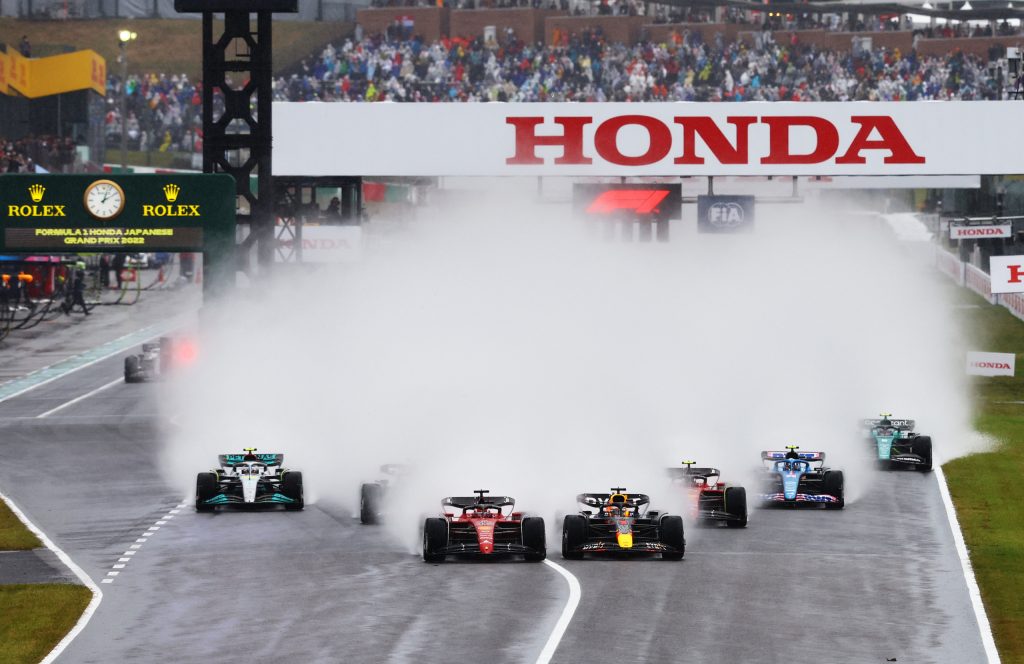Author: Barkha Roy
The Formula 1 world was stunned when Red Bull’s incredible winning streak came to an end in Singapore, with Ferrari’s Carlos Sainz taking a commanding victory from pole position. But as the F1 circus moves to Suzuka, all the signs point to a Red Bull resurgence on one of the most beloved tracks on the calendar, setting the stage for an electrifying showdown in front of the Japanese fans.
Suzuka has a special meaning for Red Bull’s Max Verstappen, who triumphed in the previous race at this iconic circuit, leading a Red Bull 1-2 with Sergio Perez. Furthermore, history favours the Red Bull team, as the last six races in Japan, since the start of the V6 hybrid era in 2014, have all been won by Mercedes.

However, the 2023 F1 Japanese Grand Prix brings an additional layer of intrigue. It marks the first race since the end of Max Verstappen and Red Bull’s dominant winning streak. The Singapore Grand Prix revealed flaws in the armor of the championship leaders, who struggled to find the ideal configuration.
Carlos Sainz’s win in Singapore was a significant milestone for Ferrari, securing their first victory of the season. The Spaniard drove a flawless race, but the question on everyone’s mind is whether Ferrari will be able to repeat that performance in Suzuka.
As anticipation builds, all eyes will be on Red Bull this weekend. Despite numerous disputes, conspiracies continue to circulate about a technical directive that affected the team’s performance in Singapore. The Japanese Grand Prix will be a crucial moment to dispel or confirm these speculations.

Meanwhile, Charles Leclerc’s gracious congratulations to Sainz in Singapore hid his inner disappointment. Leclerc doesn’t seem to feel comfortable with the car and has had problems with consistency. The Japanese Grand Prix represents an opportunity for Leclerc to regain the initiative he seemed to have lost at Suzuka.
Ferrari’s unexpected dominance in Singapore defied conventional F1 expectations, highlighting the unpredictability of the 2023 season. With the unique demands of Suzuka, fans and pundits alike are eagerly awaiting the weekend to see how the hierarchy unfolds.
Carlos Sainz enters the Japanese Grand Prix on the back of a remarkable run of results, consistently outperforming Charles Leclerc. Will he be able to keep up the pace and further strengthen Ferrari’s resurgence?
On the other hand, Lance Stroll’s difficulties at Aston Martin have raised serious doubts about his place in a top team. The Canadian driver is facing increasing pressure in an attempt to turn his season around.
Finally, the resolute confidence in Max Verstappen’s return to the podium dominates the conversations. Red Bull enthusiasts are hoping for a comprehensive return to form, setting the scene for an exciting race weekend.

With the start of race week in Japan, the weather is expected to be hot, with temperatures around 30 degrees Celsius. According to Weather.com, the hot conditions in Suzuka are expected to persist throughout the week, with intermittent showers forecast. However, as we get closer to the weekend, the likelihood of rain decreases.
On Friday, the forecast indicates a daytime high of 29 degrees Celsius, with a 53% chance of precipitation. The possibility of rain could disrupt the F1 teams’ race simulations. For Saturday and Sunday, dry conditions are expected, making Friday’s wet FP2 session of limited value.
Saturday is expected to be another hot day, with a maximum temperature of 29 degrees Celsius. The chances of rain are minimal, at just 14%, although the forecast is for cloudy weather. This weather pattern continues until Sunday, with slightly lower temperatures of 27 degrees Celsius. At the moment, race day also looks to be rain-free.
|
|
Day | Time (Brasilia) |
| Free Practice 1 | Thursday | 23h30 |
| Free Practice 2 | Friday | 03h |
| Free Practice 3 | Friday | 23h30 |
| Classification | Saturday | 03h |
| Racing | Sunday | 02h |


